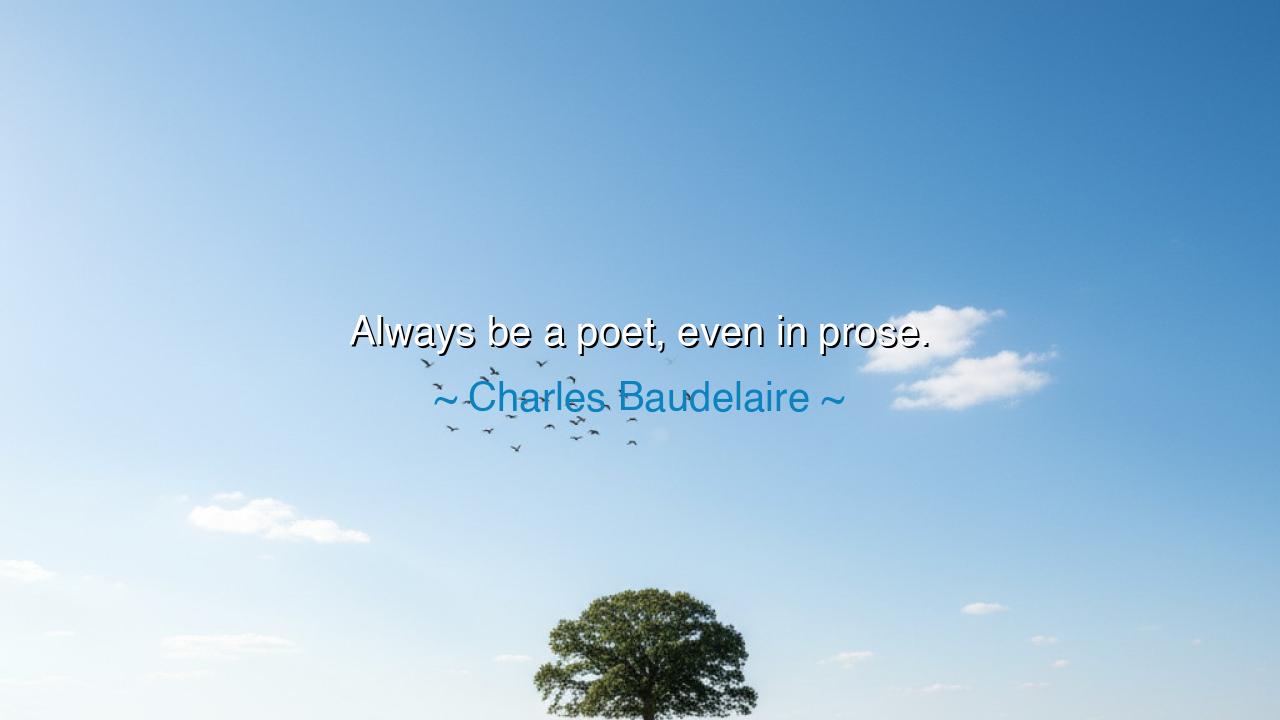
Always be a poet, even in prose.






Hear the command of Charles Baudelaire, prophet of modern beauty and singer of shadows: “Always be a poet, even in prose.” These words strike like a bell through time, reminding us that poetry is not confined to the narrow temple of verse. It is a way of seeing, a way of breathing, a way of being alive. To be a poet in prose is to carry imagination into every sentence, to suffuse ordinary speech with rhythm, image, and fire. It is to look upon the world not with the dull gaze of habit, but with the ever-awakened eye that sees wonder, terror, and glory in the simplest of things.
Baudelaire, who wrote in the decadent streets of 19th-century Paris, was himself a master of this principle. His Petits Poèmes en prose sought to prove that the spirit of poetry could live outside the measured line, that it could enter into the flowing river of prose and still shimmer with beauty. For him, poetry was not merely form, but essence: the power to lift language beyond utility, to make it sing. Thus his command is not only for poets, but for all who write and speak—to adorn life with vision, to carry the intensity of art into the common tongue.
The ancients also knew this secret. Plato, though writing in prose, soared with the wings of metaphor and myth. His dialogues were philosophy, but also music, shaped with cadence and imagery that gave them enduring power. Marcus Aurelius, in his Meditations, wrote not as a poet but as an emperor; yet his words shine with poetic force, lifting them beyond instruction into timeless wisdom. Even in prose, they were poets, for they allowed truth to breathe in beauty.
History gives us other examples. Abraham Lincoln, though not a poet by trade, wrote the Gettysburg Address in prose so spare and precise that it reads like poetry carved from stone. He did not need rhyme nor meter to achieve grandeur. His vision, distilled into words, gave them cadence that moved the soul. Here is the living proof of Baudelaire’s command: that prose, when written with poetic spirit, can endure for centuries, stirring hearts as deeply as any verse.
To be a poet even in prose is to resist the temptation of dullness, of speech that merely informs but does not inspire. It is to treat language as sacred, as a vessel of truth and beauty. In our age, where words are spent cheaply and hurriedly, Baudelaire’s wisdom stands like a tower: let even your emails, your letters, your journals carry the spark of vision. Let your language reveal not only facts but also the soul that perceives them.
The lesson for us is this: cultivate the poet’s heart in all things. Do not confine beauty to rare occasions or sacred texts. When you write, let your words live. When you speak, let rhythm and image rise naturally, as though your voice were a lyre. And in how you see the world, always search for the flame within the ordinary: a tree becomes a cathedral, a face becomes a history, a day becomes eternity. In doing so, you will not only enrich your language, but your very life.
Therefore, remember Baudelaire’s command: “Always be a poet, even in prose.” Live as one who seeks beauty in all things. Write as one who believes words are vessels of fire. Speak as one who knows that truth without beauty withers. In this way, you will discover that poetry is not merely an art but a way of existence—one that transforms every act of language into a hymn to life itself.






MTVu Minh Tue
The concept of carrying the spirit of poetry into prose is beautiful, but it makes me wonder if it always works in every context. Are there times when prose should simply be straightforward and clear, without any embellishment? Can trying to be too poetic in prose sometimes make the message unclear or overly complicated? How do you maintain the balance between poetic expression and effective communication in writing?
THTHI LE THUY HO
Baudelaire’s advice to always be a poet, even in prose, is intriguing but challenging. Is it possible to be poetic in prose without sounding overly flowery or pretentious? At what point does prose stop being practical and become more about style or aesthetics? Can this approach hinder the readability of your work, or does it actually enrich the depth and impact of your writing?
MNManh Nguyen
I love the idea of being a poet in every form of expression, as Baudelaire encourages. But how does one keep that poetic essence intact when writing prose? Is it about choosing words carefully, creating vivid imagery, or capturing emotions in a unique way? Can anyone write ‘poetically’ in prose, or is it a skill that only certain writers can master? How do you balance the lyrical with the functional?
AHanhhlee huy
Baudelaire’s quote really resonates with me. It suggests that poetry isn’t just about form or structure, but about living with a sense of beauty, imagination, and depth in everything we do, even in ordinary writing. But can prose truly carry the same poetic qualities as poetry, or do they remain inherently different? Can you be ‘poetic’ in your prose without losing clarity or purpose?